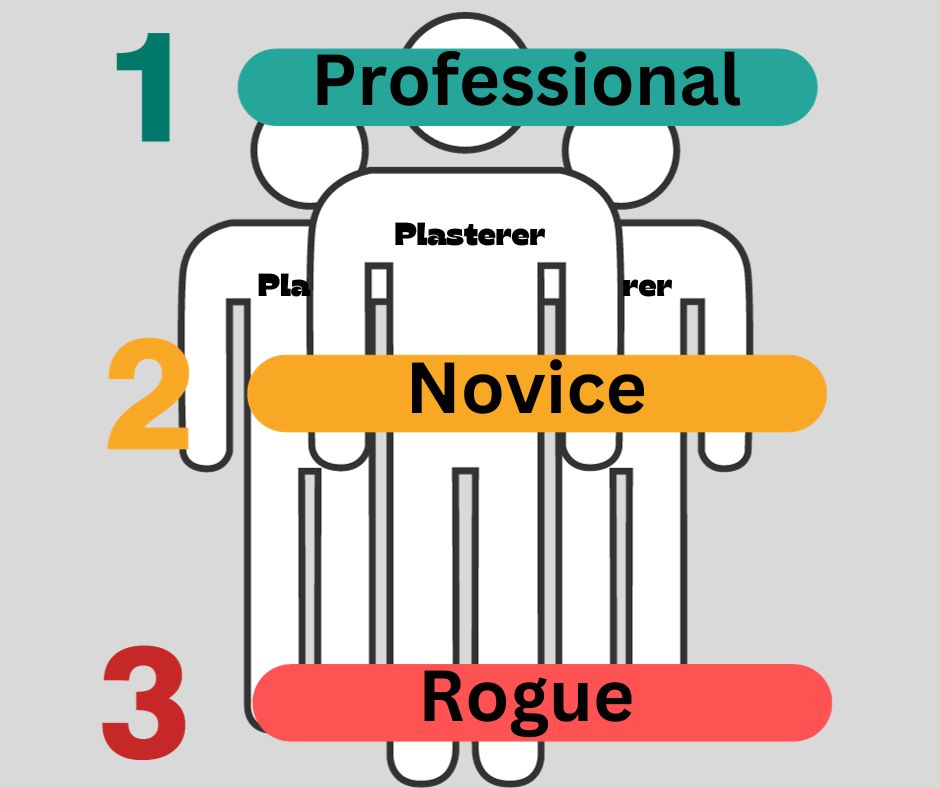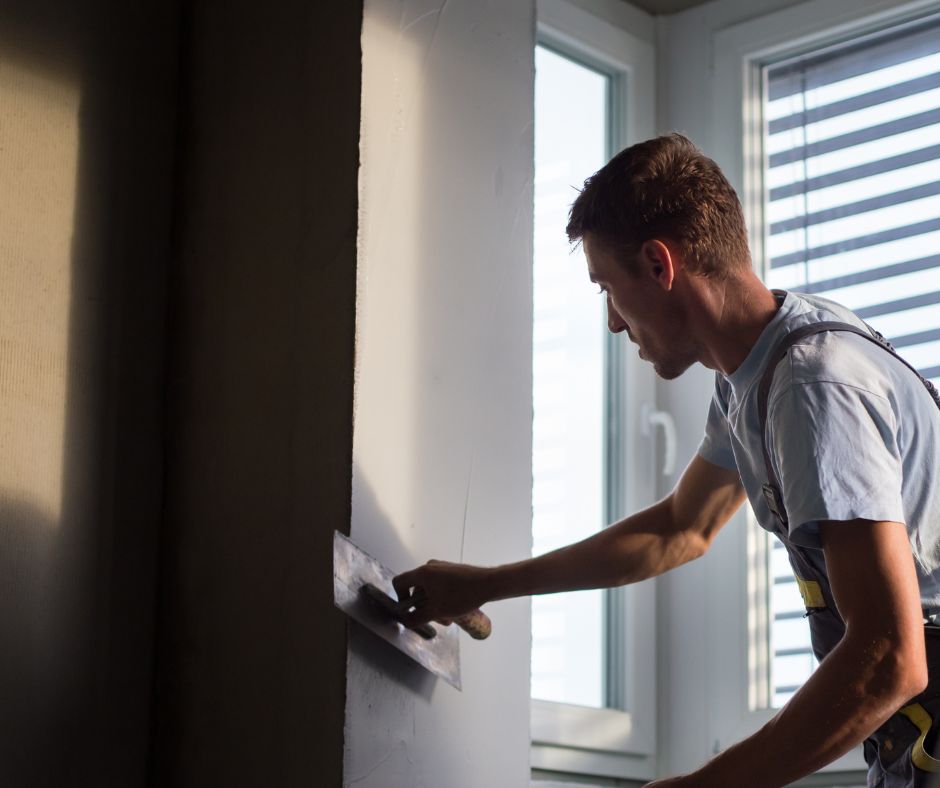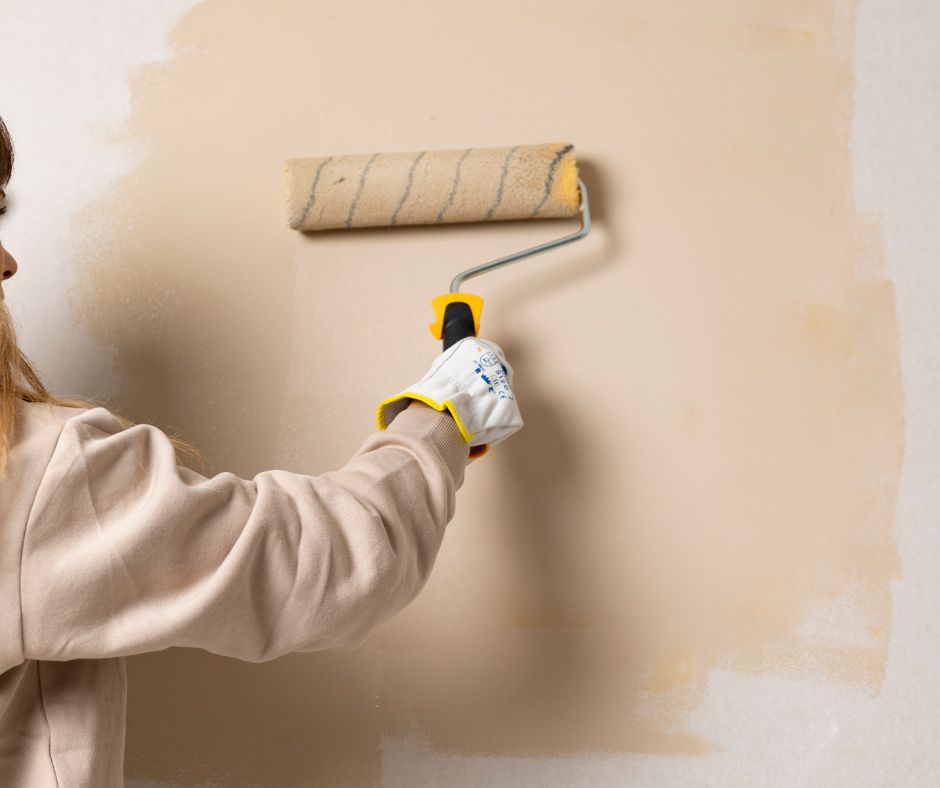Welcome to P3 Plastering’s comprehensive guide on how to find a good plasterer for your home or project. In the ever-expanding world of plastering services, it can be challenging to distinguish the true professionals from those who may not meet your expectations. At P3 Plastering, we understand the importance of securing a plasterer who delivers quality workmanship and exceptional service.
As specialists in the field, we’ve noticed the increasing frustration among individuals who unknowingly fall prey to sub-standard plastering work or unscrupulous traders. The good news is that finding a reputable plasterer doesn’t have to be a daunting task if you know what to look for and the right questions to ask.
Join us on this journey as we share valuable insights, tips, and precautions to empower you in making an informed decision when choosing a plasterer. Whether you’re a homeowner, property manager, or business owner, our guide aims to equip you with the knowledge needed to navigate the plastering landscape confidently.
Let’s delve into the world of plastering and discover how you can ensure a smooth and successful experience with your chosen plasterer. Your satisfaction is our priority, and we’re here to guide you every step of the way.
Table of Contents
- The Power of Word of Mouth
- Don’t Take Adverts At Face Value
- Navigating the Plastering Landscape: Understanding the Three Types of Plasterers
- The Quoted Price:
- Tips for Selecting the Right Plasterer: A Roadmap to Quality Craftsmanship
- Frequently Asked Questions: How to find a Good Plasterer.
- Conclusion: Crafting Your Plastering Success Story
The Power of Word of Mouth

When it comes to finding a reliable plasterer, one of the most powerful tools at your disposal is good old-fashioned word of mouth. Recommendations from trusted sources can be invaluable in steering you towards a plasterer who not only meets but exceeds expectations.
Consider reaching out to your network of friends, family, and neighbours for their experiences and suggestions. More often than not, someone in your circle has enlisted the services of a skilled plasterer and can share firsthand insights into the quality of work, professionalism, and overall satisfaction with the service provided.
Personal recommendations go beyond what any advertisement or online listing can convey. They provide a genuine account of a plasterer’s capabilities and reliability. Ask probing questions:
How was their experience working with the plasterer?
Was the job completed to satisfaction, and within the agreed-upon timeframe?
Did the plasterer demonstrate professionalism and courtesy throughout the project?
By tapping into the experiences of those you trust, you not only increase the likelihood of finding a skilled plasterer but also gain insights into the potential challenges or considerations that may arise during the plastering process.
Remember, a plasterer with a strong word-of-mouth reputation is likely to prioritise customer satisfaction, knowing that their business thrives on positive referrals and testimonials. Don’t underestimate the value of this organic form of endorsement; it can be the key to discovering a plasterer who consistently delivers exceptional results.
If, however, personal recommendations are not readily available, fear not. Our guide is designed to equip you with additional strategies and insights to ensure you find a plasterer who not only meets but exceeds your expectations.
Don’t Take Adverts At Face Value

In the digital age, plasterer advertisements are everywhere, spanning the internet, telephone directories, and local papers. However, it’s crucial not to be swayed solely by the presence of an advertisement for plastering services. Unlike other trades such as electricians and gas safe plumbers, the plastering industry lacks strict regulations, and this means that virtually anyone can advertise their services, regardless of their expertise or training. It is therefore important to be cautious when sourcing a plasterer through an advertisement.
The first pitfall to avoid is assuming that all plasterers who advertise are equal in skill and professionalism. Unfortunately, this is far from the truth. The absence of industry-wide regulations means there’s a spectrum of practitioners, ranging from seasoned professionals to novices and, unfortunately, a few unscrupulous individuals.
To navigate this landscape wisely, consider the following:
- Verify Qualifications: Many reputable plasterers obtain an NVQ qualification in plastering, showcasing a commitment to their craft. While not an absolute necessity, this qualification can serve as a valuable indicator of a plasterer’s dedication to their profession.
- Experience Matters: The essence of plastering is gained through years of practice. Seasoned professionals bring not only skill but also a track record of successful projects. Look for plasterers with a wealth of experience and a portfolio showcasing their completed work.
- Insurance and References: A reliable plasterer should be adequately insured, providing protection for both parties involved. Additionally, ask for references from previous clients. A reputable plasterer will gladly share this information, allowing you to gauge the quality of their work and professionalism.
- Beware of Inexperienced Plasterers: Some individuals may advertise plastering services after completing short courses or apprenticeships. While these initiatives have their place, they rarely produce plasterers with the depth of experience needed for consistently high-quality work. Be cautious and enquire about a plasterer’s hands-on experience before making a decision.
Remember, a well-crafted advertisement doesn’t necessarily translate to superior plastering skills. In the upcoming sections, we’ll delve deeper into distinguishing between different types of plasterers and provide additional insights to empower you in making an informed choice for your plastering needs. Stay tuned for more valuable tips!
Navigating the Plastering Landscape: Understanding the Three Types of Plasterers

Distinguishing between the various types of plasterers is crucial when seeking a professional for your project. We’ll explore three distinct categories:
- Good Quality Professional Plasterers: Seasoned experts with years of experience, a commitment to excellence, and often equipped with an NVQ qualification in plastering.
- Inexperienced Plasterers: Individuals new to the field, whether recent apprentices or course graduates. While they are in the learning phase, some may lack the depth of experience needed for complex projects.
- Rogue Traders, Cowboy Builders, Con Men: Unfortunately, a minority exists within the trade with unethical practices. These individuals may prioritise financial gain over quality work, potentially leaving clients dissatisfied and out of pocket.
Each category presents its own set of considerations. Understanding the characteristics and risks associated with each type empowers you to make informed decisions when selecting a plasterer for your specific needs. Let’s explore each type in detail to guide you through this important decision-making process.
1. Good Quality Professional Plasterers

Among the plastering landscape, a significant portion comprises dedicated professionals who take pride in their craft. These individuals are not just plasterers by title; they are experienced, skilled tradesmen who have dedicated years to perfecting their expertise. While the plastering industry lacks strict regulatory requirements, many of these professionals hold an NVQ qualification in plastering, a testament to their commitment to excellence.
Key Characteristics of Professional Plasterers:
- Extensive Experience: Professional plasterers have spent considerable time in the industry, refining their techniques and mastering the art of plastering. They bring a wealth of experience to each project.
- Reputation for Quality Work: These professionals have built a solid reputation for delivering high quality plastering. Satisfied clients become advocates, contributing to the plasterer’s positive word-of-mouth reputation.
- Proper Insurance: Recognising the importance of client protection, professional plasterers carry appropriate insurance coverage. This not only safeguards the client but also reflects the plasterer’s commitment to ethical and responsible business practices.
- Showcase of Work: Professional plasterers are proud to showcase their completed projects. They can provide a portfolio of their work, allowing potential clients to assess the quality and consistency of their craftsmanship.
- References: A hallmark of a professional plasterer is their willingness to provide references from past clients. These references offer valuable insights into the plasterer’s work ethic, reliability, and overall professionalism.
Why Choose a Professional Plasterer:
Opting for a professional plasterer ensures a smooth and successful plastering experience. Their dedication to their craft, combined with a proven track record, instills confidence that your project will be completed to the highest standards. They are also equipped for dealing with complex and any potential unexpected issues.
In the next sections, we’ll explore the other types of plasterers, offering guidance on how to distinguish between them and make an informed decision for your specific needs.
2. Inexperienced Plasterers

As is the case with any skill there will always be those who are part of the learning process. These individuals are at the early stages of their plastering careers, having recently entered the field through apprenticeships, training programs, or courses. While every professional has a starting point, distinguishing inexperienced plasterers from their seasoned counterparts becomes essential for making informed decisions.
Characteristics of Inexperienced Plasterers:
- Limited Work History: Inexperienced plasterers may have a limited track record, having recently completed training or apprenticeships. Their exposure to real-world projects may be less extensive than that of seasoned professionals.
- Varied Training Programs: Some inexperienced plasterers may have completed short training courses promising rapid entry into the field. However, it’s crucial to recognise that plastering is a skill gained over time, and these courses may not provide the depth of experience necessary for complex projects.
- Building Skill Through Practice: While theoretical knowledge is important, inexperienced plasterers are in the process of building practical skills through hands-on experience. This learning curve may result in longer project timelines and potential challenges in handling unforeseen issues.
Considerations When Dealing With Inexperienced Plasterers:
- Extended Project Timelines: Due to the learning curve, inexperienced plasterers may take longer to complete projects compared to their more seasoned counterparts. This factor should be considered when evaluating quotes and project timelines.
- Limited Exposure to Challenges: Inexperienced plasterers may not have encountered a wide range of challenges that can arise during a project. This lack of exposure could impact their ability to handle unexpected issues efficiently.
- Qualifications vs. Experience: While some may hold certificates or qualifications, it’s essential to recognise that experience is a key factor in assessing the capabilities of an inexperienced plasterer. Practical skills developed through on-the-job experience are crucial for delivering high-quality and consistent results.
Choosing an inexperienced plasterer requires a careful balance of understanding their learning journey while managing expectations regarding project timelines and potential challenges. In the subsequent sections, we’ll explore the third category—rogue traders, cowboy builders, and con men—providing insights to help you make well-informed decisions for your plastering needs.
3. Rogue Traders, Cowboy Builders, Con Men

While the majority of plasterers are dedicated professionals committed to delivering quality work, it’s crucial to acknowledge the presence of a small but impactful minority—rogue traders, cowboy builders, and con men. These individuals operate outside the bounds of ethical practices, prioritising personal gain over client satisfaction. Identifying and avoiding this category of plasterers is vital to safeguard your project and financial investment.
Characteristics of Rogue Traders, Cowboy Builders, Con Men:
- Unethical Practices: Individuals falling into this category are characterised by a lack of professional ethics. They may prioritise financial gain without regard for delivering quality work or adhering to industry standards.
- Requesting Upfront Payments: Rogue traders often request substantial upfront payments, sometimes without a clear contract or detailed project scope. This practice can leave clients vulnerable to incomplete or sub-standard work.
- No Insurance Coverage: Unlike reputable professionals, rogue traders may lack proper insurance coverage. This absence of insurance exposes clients to potential liabilities in case of accidents or damage during the project.
- Disregard for Building Regulations: Ethical plasterers adhere to building regulations and industry standards. Rogue traders, on the other hand, may disregard these regulations, leading to potential legal and safety issues.
Protecting Yourself From Rogue Traders:
- Research and Verification: Thoroughly research any plasterer you consider hiring. Look for reviews, testimonials, and examples of their previous work. Verify their credentials and check if they have a physical business address.
- Avoid Substantial Upfront Payments: Exercise caution when a plasterer requests a significant upfront payment before starting the project. Reputable professionals typically follow a more structured payment schedule tied to project milestones.
- Check for Insurance: Ensure that the plasterer has proper insurance coverage. This protects you from potential liabilities and demonstrates a commitment to professionalism.
- Report Unethical Practices: If you encounter a rogue trader or suspect unethical practices, report them to your local trading standards office. Reporting such cases helps protect others from falling victim to similar schemes.
As we delve into the considerations for selecting a plasterer, it’s essential to keep these categories in mind. The final tips and checklist provided in the subsequent sections will empower you to make informed decisions and secure the services of a reputable, skilled plasterer for your project.
The Quoted Price:
After understanding the various types of plasterers, it’s time to explore a critical aspect of the decision-making process—the quoted price. The cost of plastering services can vary significantly, and while it’s tempting to opt for the most budget-friendly option, it’s crucial to approach pricing with a discerning eye.
1. Avoid Cheap Plasterers:

Reasons to Be Cautious:
- Quality Concerns: Plastering is a skill that demands expertise, and professionals adhere to market values. Extremely low prices may indicate a lack of skill, experience, or even adherence to proper work standards.
- Inexperienced or Rogue Traders: Very cheap quotes often come from inexperienced plasterers or rogue traders who prioritise quantity over quality. Choosing such options can lead to sub standard workmanship, project delays, or even financial loss.
- Risk of Additional Costs: Opting for the cheapest quote can be a risky venture. If the work is substandard, you may end up spending more to rectify the issues, ultimately costing you more than if you had chosen a reputable plasterer from the start.
2. Day Rates
While evaluating quotes, be wary of day rates offered by plasterers. Inexperienced plasterers may take significantly longer to complete a project than seasoned professionals, leading to unexpected costs.
Tips When Considering Quotes:
- Ask About Project Duration: Enquire about the expected duration and the number of plasterers involved to assess the efficiency of the team. If using a plasterer who quotes on day rates always get a price for the job too ie day rate x how many days it’s going to take. You can then make a true comparison to someone whose day rate may be higher but who can get it done faster. At the end of the day both quotes are comparable it’s just one sounds cheaper when you don’t know the full picture.
- Compare Quotes Carefully: Don’t solely base your decision on price. Compare quotes comprehensively, considering factors like experience, references, and the scope of work included.
3. Caution Regarding Middlemen

In the modern digital landscape, many online marketplace platforms have become prevalent, positioning themselves as facilitators connecting clients with tradesmen. While their service model might seem convenient, it’s imperative to peel back the layers and understand the dynamics at play.
These platforms often function as middlemen, essentially acting as internet marketers rather than genuine service providers. Their primary expertise lies in online advertising, strategically placing themselves at the forefront of search engine results, dominating the first page of Google and overshadowing individual businesses offering specialised services.
The premise they sell to clients is that they meticulously collect reviews to ensure the quality of the tradesmen they recommend. However, the reality is that their core business revolves around generating leads, which they then sell to plasterers and other tradesmen for a significant fee. This fee, unfortunately, becomes an additional cost for the tradesman, ultimately impacting the client’s overall expenses.
It’s crucial, however, to distinguish between these middlemen platforms and reputable trade membership programs that operate with a different ethos. Platforms like the Federation of Master Builders, Checkatrade and some others follow a unique model where they don’t sell leads. Instead, they offer a platform for tradesmen to advertise their services, allowing clients to directly contact them via the profiles they have created. This approach eliminates the intermediary fee, providing a more transparent and cost effective solution for both the tradesmen and clients.
Importantly, genuine trade membership sites often go beyond advertising. They typically vet their members prior to allowing them to join, ensuring a level of professional competence and reliability. Furthermore, these platforms frequently provide an arbitration service, offering a means of resolution in the rare instances where issues may arise during a project. Some also go the extra mile by guaranteeing members’ work up to a certain value, instilling additional confidence in clients.
In contrast, lead generating platforms don’t vet tradesmen beyond basic ID checks. Instead, they rely on homeowners to assess the tradesmen’s suitability through reviews. Additionally, they usually have a disclaimer stating that they are not responsible for the work a tradesman does, putting the onus on the homeowner to navigate potential issues.
While online advertising platforms can provide a quick and accessible way to find tradesmen, clients must be aware of the distinctions in service offerings. Thorough research into the platform as well as individual tradesmen must be done. Seeking direct recommendations, and evaluating online reviews in depth remain crucial steps in making an informed decision to use these type of services.
4. Terms and Conditions

Before finalising any agreement, carefully review the terms and conditions provided by the plasterer. Reputable professionals present these documents to ensure clarity and mutual understanding.
Points to Consider
- Deposit Policy: Reputable plasterers usually do not require a substantial upfront deposit. If a deposit is requested, it should not exceed 20% of the total job cost.
- Amendments and Clarifications: Read through the terms and conditions, seeking clarification on any points that seem ambiguous or require adjustment. It’s essential to address potential issues before the work begins.
In the journey to find a good plasterer, navigating through pricing considerations is pivotal. The balance between cost and quality is achievable by conducting thorough research, considering various quotes, and understanding the terms and conditions associated with the project.
Tips for Selecting the Right Plasterer: A Roadmap to Quality Craftsmanship

Embarking on the journey to find the ideal plasterer requires a strategic approach and a keen eye for quality. Here are essential tips to guide you through the selection process, ensuring that you choose a professional who meets your expectations and delivers impeccable plastering services.
Tip #1: Seek Recommendations from Trusted Sources
The foundation of a successful search for a plasterer begins with recommendations from your trusted network. Friends, family, and neighbours who have had positive experiences can point you in the direction of skilled professionals. This firsthand feedback provides valuable insights into the plasterer’s workmanship, reliability, and overall customer satisfaction.
Tip #2: Don’t Take Advertisements at Face Value
In a world flooded with advertisements, it’s crucial not to be swayed solely by catchy slogans or appealing visuals. Plastering services are often advertised widely, but not all advertisements guarantee quality. The plastering industry lacks strict regulations, allowing individuals with varying levels of expertise to offer their services. Dig deeper, ask questions, and don’t be lured by surface-level promotions.
Tip #3: Recognise the Three Types of Plasterers
Understanding the landscape of plastering professionals is key to making an informed decision. There are three primary types of plasterers:
- Good Quality Professional Plasterers: These individuals boast years of experience, a commitment to quality, and often hold relevant qualifications. They can provide references, showcase their work, and have a reputation for excellence.
- Inexperienced Plasterers: Individuals in the early stages of their plastering careers may lack extensive experience. While apprenticeships and training courses exist, distinguishing between promising novices and those unprepared for professional work is essential.
- Rogue Traders and Cowboy Builders: A minority within the industry, these individuals prioritise financial gain over quality work. They may lack insurance, ignore building regulations, and pose a risk to unsuspecting clients.
Tip #4: Evaluate Experience and Skill Level
When assessing plasterers, prioritise experience over qualifications alone. While qualifications such as NVQ in plastering are beneficial, hands-on experience is paramount. Professional plasterers have perfected their skills over years, ensuring they can handle various challenges and deliver impeccable results consistently.
Tip #5: Scrutinise Quotes and Day Rates
Be cautious when evaluating quotes and day rates. Extremely low prices may indicate inexperienced or unprofessional plasterers, while excessively high rates may involve intermediaries inflating costs. Request a detailed breakdown of costs, enquire about the expected duration of the job, and establish maximum pricing agreements to avoid unwelcome surprises.
Tip #6: Exericise Caution Regarding Adverts By Middlemen
Exercise caution when dealing with middlemen platforms connecting clients with tradesmen for a fee. Platforms like MyBuilder.com may dominate online searches, but their core business involves selling leads to tradesmen, potentially adding extra costs. If you need to use a middleman to find a good plasterer prioritise trade membership programs that vet members, offer arbitration, and may guarantee work for a more transparent and reliable plastering experience. Thorough research and direct recommendations remain crucial in making informed decisions.
Tip #7: Verify References and Online Presence
A reputable plasterer should willingly provide references from previous clients. Take the initiative to contact these references, gaining insights into the plasterer’s communication, punctuality, and work quality. Additionally, explore online reviews, forums, and social media to assess the plasterer’s reputation within the digital realm.
Tip #8: Avoid Significant Upfront Payments
In most cases, reputable plasterers do not require substantial upfront payments. If a deposit is requested, it should not exceed 20% of the total project cost. Be wary of those demanding large payments before commencing work, as this can be indicative of unprofessional practices.
Tip #9: Thoroughly Review Terms and Conditions
Before giving the green light for work to commence, carefully review the plasterer’s terms and conditions. Clear documentation ensures that both parties understand the agreed-upon terms, minimising the risk of misunderstandings or disputes later on.
By incorporating these tips into your selection process, you’re empowered to navigate the complexities of choosing a plasterer with confidence. The goal is not just to find a professional for a one-time project but to establish a relationship with a skilled craftsman committed to delivering exceptional results.
Frequently Asked Questions: How to find a Good Plasterer.
How do I know if I need a plasterer?
Signs of cracked or uneven walls, water damage, or outdated textures are indicators that your walls might benefit from professional plastering. Consult with a plasterer to assess your specific needs.
What sets professional plasterers apart?
Professional plasterers typically have extensive hands-on experience, a solid reputation, and often possess relevant qualifications such as an NVQ in plastering. They should also be insured and able to provide references.
How can I find a reliable plasterer?
Recommendations from friends, family, and neighbours are valuable. Additionally, scrutinise online reviews, check for references, and ask potential plasterers about their experience and guarantees.
How long does a plastering project usually take?
The duration varies based on the scope of the project. Avoid open ended day rates no matter how cheap they seem to be. Experienced plasterers are transparent and can provide estimates based on the size and complexity of the job during consultations. This way you know how much it’s going to be and how long it’s going to take before work starts.
Should I be concerned about very cheap plastering services?
Extremely low prices may indicate inexperience or a lack of quality materials. Professional plastering services have a market value, and choosing very cheap options may lead to sub- standard results.
Do I need to pay a deposit upfront?
In most cases, reputable plasterers don’t require a deposit exceeding 20% of the total job cost. Be cautious of requests for large upfront payments and ensure all terms are clearly outlined in the contract.
How can I check a plasterer’s references?
Request contact information for past clients and enquire about their experience. A reliable plasterer will gladly provide references, showcasing their commitment to quality work.
What should I look for in terms and conditions?
Read through the terms and conditions thoroughly. Ensure clarity on project scope, timelines, costs, and any guarantees. If anything seems unclear or needs adjustment, discuss it before work begins.
Are plastering companies regulated?
Unlike some trades, plastering is not heavily regulated. It’s crucial to rely on recommendations, experience, and references to gauge the professionalism of a plastering service.
Can I request a quote online?
Absolutely, many plasterers offer online quoting services. However, a thorough on-site evaluation is often necessary for accurate quoting. Contact us to discuss your project specifics.
Conclusion: Crafting Your Plastering Success Story

In conclusion, we at P3 Plastering hope that this comprehensive guide has empowered you with the knowledge and insights needed to navigate the process of finding a skilled and reliable plasterer. In the intricate world of plastering services, distinguishing between professionals, novices, and unscrupulous traders is crucial for the success of your project.
Remember the power of word of mouth – tapping into the experiences of friends, family, and neighbours can guide you toward a plasterer with a proven track record of quality work and professionalism. Personal recommendations provide genuine insights that go beyond what advertisements can convey.
Speaking of advertisements, don’t take them at face value. The plastering industry lacks strict regulations, and not all plasterers who advertise are equal in skill and professionalism. Verify qualifications, check experience, and ask for references to ensure you’re making an informed decision.
Understanding the three types of plasterers – good quality professionals, inexperienced plasterers, and rogue traders – is crucial. Each category has its considerations, and being aware of them will empower you to choose a plasterer that aligns with your specific needs.
When evaluating quotes, be cautious of extremely low prices, as they may indicate a lack of skill or professionalism. Thoroughly review terms and conditions, avoid substantial upfront payments, and seek clarity on all aspects before giving the go-ahead for your project.
Our tips for selecting the right plasterer serve as a roadmap to quality craftsmanship. Seek recommendations, check out reviews, evaluate experience, verify references, and carefully consider all aspects before making your decision. We’re here to guide you every step of the way because your satisfaction is our priority.
Now armed with this knowledge, you’re well-prepared to embark on your journey into the world of plastering. Whether you’re a homeowner, property manager, or business owner, finding the right plasterer is a crucial step towards ensuring a smooth and successful experience. Thank you for choosing P3 Plastering, and we look forward to assisting you in your plastering endeavours.
If you’re based in South Yorkshire, read our local guide to hiring a plasterer in Sheffield for more specific tips.





